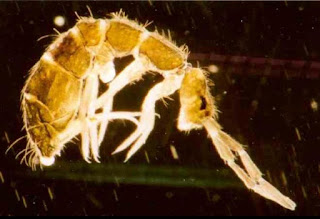Order
COLLEMBOLA (and Class)
(Greek, kolla= glue; embolon= tail)
(Greek, kolla= glue; embolon= tail)
Description
Springtails are small soil and leaf litter-dwelling arthropods that are closely related to insects. They are soft-bodied, wingless and their compound eyes are either absent or weakly developed. The mandibles are well developed but hidden inside head folds until pushed out for feeding. Body length ranges from 0.2-6.0 mm. Antennae have 4-6 segments. The abdomen is six-segmented and has a specialised appendage called a furcula on the fourth segment. When the arthropod is at rest, the furcula is folded under the body and is caught on a specialised hook on the third segment. When the furcula is released it rapidly moves downward and hurls the arthropod into the air, hence the common name of springtail. Springtails are an extremely ancient order and are known from Devonian fossil deposits.
Life Cycle
On hatching from the eggs, nymphs resemble miniature adults. The immature springtail nymphs pass through several moults of the exoskeleton until they reach adult size and maturity.
Food
Springtails are abundant in decaying plant material and are one of the principal litter organisms on rainforest floors. Most springtails consume decaying plant material but some species attack fungi or feed on growing plants.
Importance
Springtails appear to be extremely important in the biological cycles of plant communities because they assist in the decomposition of litter. They are generally present in immense numbers and as such they often form an important food source for ground foraging forest birds.
Other
Springtails can be collected by placing leaf litter in a funnel with a piece of mesh under the leaf litter so that it doesn't drop into your collecting jar. Place a light globe over the top of the funnel and a jar containing alcohol at the bottom. Leave the light on overnight and the leaf litter organisms will burrow down away from the light and heat and will be collected in the jar of alcohol.















No comments:
Post a Comment